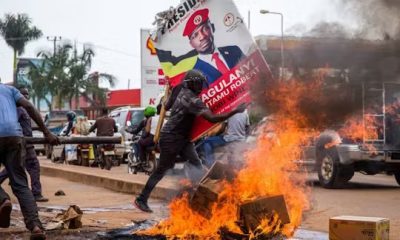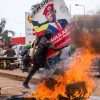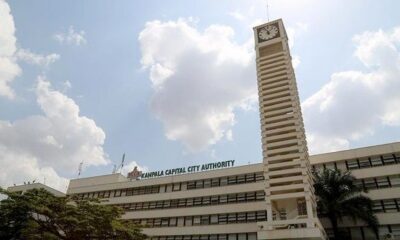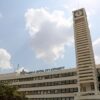Editorial
South Sudan Peace: Church vs. Politicians
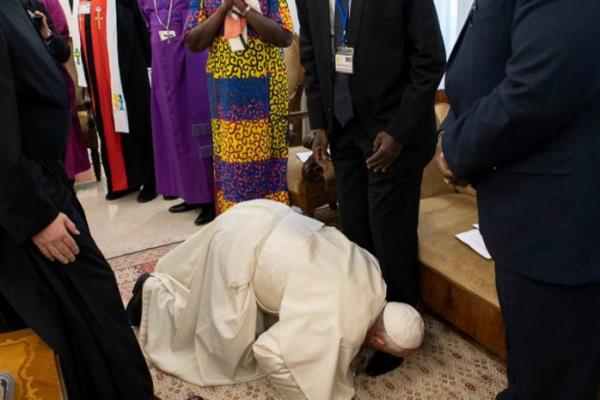
Pope kissing South Sudanese leaders
Pope Francis 1 went a notch higher than Jesus Christ last week, when he variously bent down to kiss the feet (shoes) of the five South Sudanese political protagonists, whom he had invited to the Vatican for a retreat to foster peace among them. In the Gospel of John 13, Jesus bent down to wash and dry his disciples feet in what He said, “Righteousness demands”.
In a way, what the Pope did typifies this. But whereas Christ did it to his disciples, the Pope was doing it to a very disparate number of people in their thinking and attitude, in this case, to the demand for peace in the war-torn South Sudan.
After its independence in 2011, the political contestants; President Salva Kiir and Vice President Riek Machar, came to blows in 2013. The problem came about within their party, the Sudan People’s Liberation Movement (SPLM), in deciding who would become chairman, in preparation for an expected general election. It was appearing that Machar was going to beat his boss to the post – and then hell broke loose!
The short of it is that Machar had to flee Juba and took one month to trek on foot in the jungle to the Democratic Republic of Congo for safety. Eventually, he ended up in a South African exile. The resulting fighting has left about half a million people dead and displaced more than four million people.
Attempts at peace by the regional powers and the African Unity (AU), to bring about a settlement between the various warring parties, which have gone beyond, just Kiir and Machar, have so far failed. That is what led to the dramatic and the unprecedented gesture by the Pope last week.
It was more remarkable because the two protagonists; Kiir and Machar, are from different religious persuasions. Kiir is a Roman Catholic, while Machar is a Presbyterian. And whereas it might be said that these are identifiable Christians, their devotion to these different aspects can become very dogmatic.
The Presbyterians are derived from John Calvin and John Wesley, Protestant reformists who diverged from Martin Luther. It is of note that Luther broke away from the Catholic Church over disagreements over Catholic Church doctrine and practice of its sacraments. So, the Presbyterians are even further from the practices that the Catholic Church adheres to.
That is on one level of the ideal practice of Christianity; but at practical level, it goes to tribes and personal activities – and that is what affects the South Sudan politics. Kiir is a Dinka, while Machar is a Lou Nuer. For all intents and purposes, this ethnic difference has reverberated into the practice of politics in the nascent state. Even more affecting is the traditional and cultural practices that affect the ethnicities.
Both groups have their ritualistic animist practices that contradict the practice of Christianity. In particular, Kiir has not been shy to practice his rituals of jumping over a carcass of a white cow in appeasing the ancestors and securing an atmosphere for calm and tranquility.
In the Christian lore, this is considered witchcraft. It is with this religious and animist background that the Pope performed the righteousness of kissing their feet. Even more touching after this, Machar raised the fear that the Juba “junta” would not respect these efforts at peace. It was a reference to the earlier failed efforts; moreover he has been a part of that failure.
Thus, in an orientation to his Presbyterianism, to effect this meeting with the Pope, it took the effort of the Anglican prelate, the Archbishop of Canterbury, Justin Welby, to convince the Pope to mediate between the South Sudan political protagonists. Welby and Francis, are aware that the AU’s and other regional powers failure at getting South Sudan to peace.
Against this background the Pope’s iconic act was more than a gesture. The emotional impact of it was such that it led to some of the five South Sudanese leaders, whom the Pope kissed their feet, to shed a tear. The shock of this feet-kissing signal should lend to the South Sudanese leaders to regard two levels of this effort.
Firstly, it should endear them to practice their Christianity as closely as their dogmas indicate to them. This is because it is more spiritual than the practice of their animism. Secondly, it should translate for them to develop patriotic hearts to think of the half a million people who they are responsible for their deaths; and the more than four million people who have been dispersed inside South Sudan and in the region, most of them facing the specter of famine and poverty.
Comments



